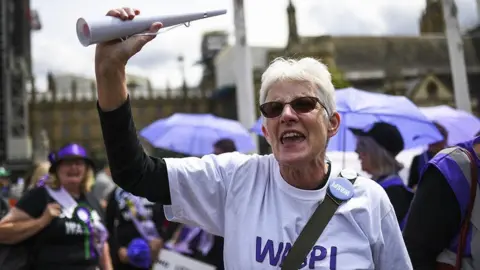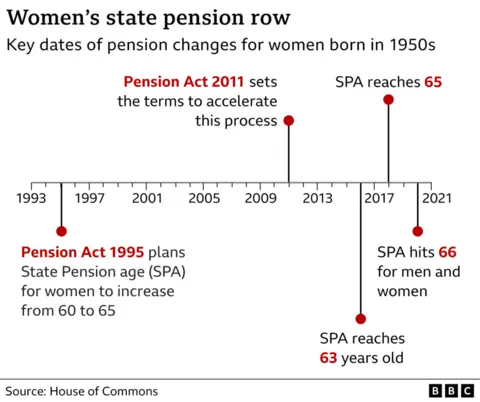Fury as women hit by state pension age rise are denied payouts

 Getty Images
Getty ImagesCampaigners have reacted with fury to what it calls the government’s “unjustified” rejection of compensation for women hit by changes to the state pension age.
They say 3.6 million women born in the 1950s were not properly informed of the rise in state pension age to bring them into line with men.
Work and Pensions Secretary Liz Kendall apologised for a 28-month delay in sending letters, but has rejected any kind of financial payouts.
Nine months ago, a parliamentary ombudsman recommended compensation of between £1,000 and £2,950 to each of those affected.
The Women Against State Pension Inequality (Waspi) campaign described the government’s decision as an “insult”.
“The government has today made an unprecedented political choice to ignore the clear recommendations of an independent watchdog,” said Angela Madden, who chairs the campaign group.
“This is a bizarre and totally unjustified move which will leave everyone asking what the point of an ombudsman is if ministers can simply ignore their decisions.”
The Waspi campaign had called for payments of at least £10,000 each.
But Kendall said there was evidence that there was “considerable awareness” of the changes to the pension age, and sending letters earlier would not have made a difference to their ability to make retirement choices.
She also said that there was no evidence of “direct financial loss” resulting from the government’s decision.
“Given the vast majority of women knew the state pension age was increasing, the government does not believe paying a flat rate to all women at a cost of up to £10.5bn would be fair or proportionate to taxpayers,” she said.
Prime Minister Sir Keir Starmer said he understood the concern of the Waspi women, but had to take into account whether it was right “to impose a further burden on the taxpayer”.
How the saga unfolded
The age at which people receive the state pension has been increasing as people live longer, and currently stands at 66 for men and women.
But for decades, men had received their state pension at 65 and women at the age of 60.
Under the 1995 Pensions Act a timetable was drawn up to equalise the age at which men and women could draw their state pension. The plan was to raise the qualifying age for women to 65 and to phase in that change from 2010 to 2020.
But the coalition government of 2010 decided to speed that up. Under the 2011 Pensions Act the new qualifying age of 65 for women was brought forward to 2018.

The increases have been controversial. Campaigners claim women born in the 1950s have been treated unfairly by the rapid changes and the way they were communicated to those affected.
Many thousands said they had no idea they would have to wait longer to receive their state pension, and had suffered financial and emotional distress as a result.
While the Parliamentary and Health Service Ombudsman (PHSO) could recommend compensation, it could not enforce it.
The work and pensions secretary said lessons would be learnt from what had happened. The government would develop an action plan to fix problems identified in the ombudsman’s report, and set a clear notice of any future changes to the state pension age.
She said that future pension communications would also use “the most up to date methods” to contact those affected.
Liberal Democrat work and pensions spokesman Steve Darling said: “Today is a day of shame for the government [which] has turned its back on millions of pension-age women who were wronged through no fault of their own, ignoring the independent ombudsman’s recommendations, and that is frankly disgraceful.”
For the Conservatives, who did not respond to the ombudsman’s report when in power, shadow work and pensions secretary Helen Whately said ministers must “own” the decision not to give payouts.
A petition to Parliament for a compensation system to be introduced had reached 135,000 signatures before Tuesday’s announcement.
Source link







